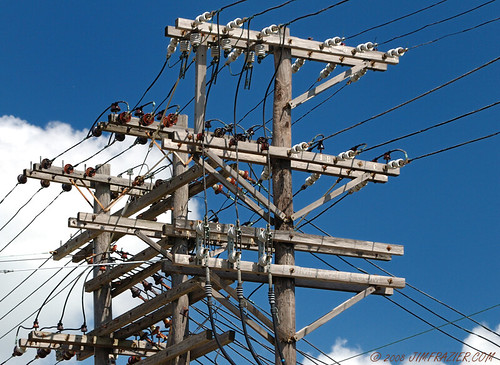 We usually think of electricity, natural gas, steam, telephone, water and sewer as utilities. Steam? Yep. In some larger cities, there are many facilities that still operate off of steam provided by a central plant and distributed via underground pipes. You hear about one of the steam pipes exploding every once in a while, in New York for example. And I think there was a particularly nasty scene in a book and movie called The Bone Collector, but we won't go there.
We usually think of electricity, natural gas, steam, telephone, water and sewer as utilities. Steam? Yep. In some larger cities, there are many facilities that still operate off of steam provided by a central plant and distributed via underground pipes. You hear about one of the steam pipes exploding every once in a while, in New York for example. And I think there was a particularly nasty scene in a book and movie called The Bone Collector, but we won't go there.Anyway, utilities are usually taxable either because the state has simply said that they're taxable, or the state has defined utilities as being tangible personal property. Notably, water and sewer are usually not taxable. But electricity and natural gas are pretty much universally taxable, though sometimes at a lower rate. And telephone service is usually taxable, but is also covered by a whole 'nuther batch of telecommunications tax laws.
There are two major exemptions related to electricity and natural gas:
1. Manufacturing - Many states that have decent manufacturing exemptions will include these in the category of exempt consumables, depending on the way the utilities are used.
2. Residential - Many states make utilities exempt when purchased for residential consumption. Sometimes, it's seasonal. The residential utilities exemption in Wisconsin, for example, only applies from November to April.
And both of the above exemptions also frequently apply to other "fuels" used in the same way, such as propane, fuel oil, etc.
The Sales Tax Guy
http://salestaxguy.blogspot.com
See the disclaimer - this is for education only. Research these issues thoroughly before making decisions. Remember: there are details we haven't discussed, and every state is different. Here's more information
Get these articles in your inbox - subscribe at http://salestaxguy.blogspot.com
Don't forget our upcoming seminars and webinars.
http://www.salestax-usetax.com/
Picture note: the image above is hosted on Flickr. If you'd like to see more, click on the photo.









